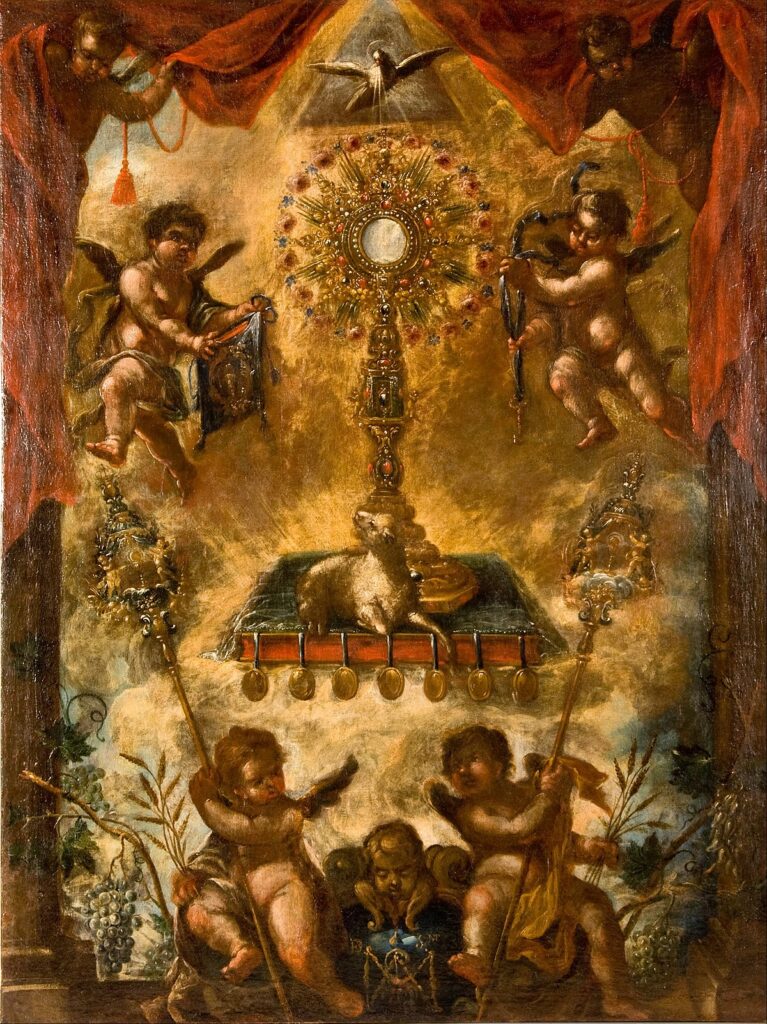
Introduction
When Catholics defend the Eucharist they typically say “Well, Jesus doubled down on John 6 when he further explained himself in other places.” Although, that is an ok defense it hardly answers the totality of the objections. In an attempt to meet the challenge of the objections
I have gone through the internet and compiled several objections to the Catholic understanding of the Eucharist. I will attempt to answer them one by one below. At the end of this article I will include the list of links from which I have obtained these objections. To match an objection to its source please refer to the number in the brackets[ ] to the left of the header and match it to the number to the left of the links at the bottom of this article. Article four has by far the most rebuttals but it is also the longest. I have not covered every objection on every article as some I have felt have already been answered earlier in the article. Of course, if you feel I have missed a point or have a question or feedback feel free to contact me by submitting a question or adding a comment to this article.
Disclaimers
Natural vs Spiritual Reality-In the rebuttals below I speak at length of a physical reality and a spiritual reality. As to avoid scandal I would like to clarify the terms a bit. In physical reality a thing takes on accidents which can be measured. In a spiritual reality however it takes on a different substance that cannot be measured. This is not to be taken as metaphor or symbolism although this reality is often rife with such. Rather, the spiritual reality is something that is 100% real but in our limited humanity we cannot measure or come to a complete understanding of. To speak of the spiritual reality in the Eucharist is not a denial of the true presence and that it is truly the body and blood of Christ. It is a recognition that the physical reality (that of the accidents of bread and wine) except in the case of miraculous exceptions do not cease to exist within the sacrament.
John 6-For the purposes of making the following articles easy to read when I refer to John 6 unless otherwise stated I am more specifically referring to verses 25-71. These verses are referred to many times and I concluded that including the verse numbers every time may be cumbersome.
[1] It takes Christ too literally
The objection claims that at other times in the gospel Jesus uses metaphor and as such he is likely using metaphor here too. Examples used are the times Jesus said “I am a door” or “I am a vine”. The problem with this argument is that other times when Jesus uses metaphor it sounds completely different. We can see by the next passages that people were not understanding him literally. Yes, they murmured against him but the audience doesn’t speak out against him for not being a door or a vine. However, in John 6:52 we see the Jews asking how Jesus can give them his flesh and his blood. How does Jesus respond? He doubles down. He doesn’t clarify. He repeats with increased fervor. He even allowed many to leave from following him. If he had not meant it literally he could have saved his flock by clarifying. So yes we take Christ’s words literally because the Jews in John 6 took his words literally and he doubled down.
[1]If he were speaking literally the disciples would have the atonement before the atonement were made
This goes back to John 6:52 when the Jews asked how Christ could give us his flesh to eat. If we can accept transubstantiation in the future after calvary then how can we say that God cannot make calvary present before it happens? Is God only unbound by time up until the present moment? I doubt anyone would deny that God exists outside of time and that he could in theory make a past reality present. That this argument is in no way denying. If this is true then we cannot reasonably deny that God can make a future reality present.
[1] Luke 22:20’s wording would indicate that the cup is holy. Not the wine.
In the context of Luke when Jesus refers to the cup he is referring to the wine in the cup. We can come to this conclusion by reviewing Matthew 26:25-29, John 6, and Mark 14:22-25 which all indicate that the understanding was that the wine was what was holy. Not the cup it was held in. Notice how the other three accounts refer to the wine and not the cup. Another clue is the original Greek. The word used for cup is ποτήριον(potérion) which in Greek is often meant to mean the contents of a cup and not the cup itself.
[1] John fails to mention the institution of the Eucharist
The writer is making a logical fallacy called “Argument for Silence”. There were many miracles that took place in the other three gospels that did not take place in the book of John. One may appeal to John 6 as an institution of the Eucharist although I must admit myself I don’t think the argument holds. I believe John 6 talks of the reality of the Eucharist but not the sacraments institution. John was also written much later and he may not have felt the need to replicate what had already been said 3 times. Not just that but unlike the other three gospels John had a specific purpose not of chronicling Christ’s ministry but asserting Christ is God and convince people to put faith in him.
[1]Problems with the Hypostatic Union and the Council of Chalcedon
The argument from the article this is taken from is pretty long but for the sake of brevity I will try my best to summarize it here. Jesus’s nature is 100% God and 100% Man. One nature does not infect or corrupt the other (this is communicatio idiomatum). The Church confirmed this at the Council of Chalcedon. Christ’s humanity did not become divine but remained in perfect humility retaining all its limitations. As such, the attribute of omnipresence cannot be compatible with Christ’s humanity. It would be illogical to state that Christ could be bodily present at every Mass. So a bit of a disclaimer before my rebuttal. I am in no way claiming that I understand completely the mystery of the Hypostatic union. I have researched the topic and have a good grasp on it but in no way am I claiming to have come to some amazing new theological conclusion. The writer makes the claim that the Council of Chalcedon rules out the possibility of communication (to share) between the two natures.
Rather in actuality the council claimed that within the hypostatic union the two natures come together “without confusion, without change, without division, without separation; the distinction of natures being in no way annulled by the union, but rather the characteristics of each nature being preserved and coming together to form one person and subsistence” This does not exclude the theological possibility that the divinity of Christ could communicate with his humanity in such a way as to allow the humanity of Christ to be present in all places. Going into scripture we read at Matthew 14:22-33 the narrative of Christ walking on water. Is this not beyond human limitation? If Christ’s divinity is able to communicate with his humanity in such a way as to allow him to walk on water then surely his divinity can share in his humanity in such a way as to allow him to be in more than one place at a single time.
[2]Accidents without substance is incoherent
The argument is that accidents cannot exist without substance in which to relate it. It is logically incoherent. The writer uses the following example. “Let’s say I tell you that I am “One inch taller.” You would rightly ask, “One inch taller than what?” I shoot back, “I am One inch taller than pure Six-footness!””. The fallacy here is this fundamentally a misunderstanding of the meaning of substance. He is taking height (an accident) and relating it to another possible accident (that is the height of six feet). Substance speaks of the actuality of the thing and not the measurable qualities for lack of a better term. The person is 6 foot 1 and human. These are his accidents. His substance is that he is a person. Say somehow I manage to make a block of wood look like an orange in taste, texture, smell, ect.In fact, I did such an amazing job that there is no scientific way to prove it’s not an orange. It retains the accidents of an orange but the substance has not changed. It is still wood.
[2] We say that accidents are fundamentally predications to a thing
When we speak of a thing we speak of properties in relation to a thing. We do not predicate whiteness to nothing. We relate it to an object. As the author notes we can contemplate the whiteness of something but not so far as there being a detachment. As the author argues “ It is inescapable because accidents are predications of things. To say that they inhere in no subject and therefore are predications of nothing is incoherent.”.
The error here is that the author in his explanation has caused the supernatural reality to become bound in reasoning applied to the natural world. The eucharist is not a natural but a supernatural reality. In other words, it does not necessarily follow the laws of the natural world. Now, I want to be careful as I don’t want this to sound as if I am falling into the God of the gaps fallacy. If I were to propose that Jesus could not pray to the Father as they are one being and thus their either must be three Gods or Jesus must not be God thus disproving the Trinity I would be admonished by most of the Christian scholastic world. For a more practical example, if we bound the supernatural to natural laws we could not claim that Jesus Christ is 100% God and 100% Man as one person cannot have 200% substance. Rather, when we speak of the supernatural we must think in terms of the supernatural world. Yes, we can use knowledge of the natural world but cannot bind the supernatural to it.
[2]Accidents are fundamentally expressions of a substance
This fundamentally falls into the same error as the last argument. In the natural world accidents are indeed expressions of their substance. We are not talking about something natural though. We are talking about a supernatural reality in which the bread supernaturally takes on the substance of Christ. Just as Jesus was 100% Man and 100% God in the Eucharist the accidents remain 100% bread and wine while the substance becomes 100% Christ.
[2]When we speak of omnipotence, we do not say that God can do anything; instead, God can do anything insofar as it does not entail a contradiction
The author is claiming that it is a contradiction that the accidents of something can exist without the substance .I’d argue that what happens in the Eucharist is not a contradiction but a mysterious paradox of sorts. It’s not something that cannot be but rather cannot be fully understood. We say that Christ takes on the appearance of bread but the substance of himself remains. He makes the argument that when you ask if a circle is a square that obviously the answer is no since the two are mutually exclusive. However, for the bread to retain the accidents and not retain the substance is not a contradiction.
Firstly, a circle could arguably become a square if a change occurs. In the Eucharist we are not claiming the bread was always God but rather in liturgy by the words of the priest a change occurs. This is the dogma of transubstantiation.
Secondly, it can only be a contradiction if we were to assume that the accident of a substance must always point to the substance itself. If I have a flat wood piece with 4 legs the substance of that thing is not necessarily a chair. The substance could be a table or a stool or even some sort of tool . Now of course in natural reasoning we are limited in what this theoretical wooden piece could be. Speaking of the supernatural, however, there is no reason to believe that it would be contradictory for a wooden piece of furniture to have a substance completely unrelated to its accidents. The only thing missing is evidence as we have with the Eucharist. Say for example I place an order for a table online. I can state with full validity that it is a table based on the information on the webpage before it arrives. In the same way if we accept the authority of scripture interpreted in the light of the Fathers we have a plethora of evidence that the substance changes although the accidents remain.
[3]He wishes to put them in the position of committing to Him despite their misunderstanding or else leaving Him
This argument fails to make much sense. If they had misunderstood him would Christ not have clarified as he had many times before throughout the gospels? Refer to Matthew 16:6-12, Mark 7:19, Luke 12:1, and John 4:32-34 to name a few. It would not make sense for Jesus to allow people to leave him because of a misunderstanding that could easily be clarified. All Jesus would have had to say is “I mean this as a metaphor or a symbol”. It seems unlikely that Jesus would purposefully put teachings into words that would be grossly misunderstood in order to “test” them.
[3]The theology of the eucharist is based on ideology
This argument claims that the reason we have read the eucharist into our theology is because it is affirmed by how other people (namely the Church Fathers) interpreted scripture. Here’s the problem with that argument though. The true presence Ignatius of Antioch. Ignatius of Antioch was a disciple of John the Apostle.
“I have no taste for corruptible food nor for the pleasures of this life. I desire the bread of God, which is the flesh of Jesus Christ, who was of the seed of David; and for drink I desire his blood, which is love incorruptible” (Letter to the Romans 7:3 [A.D. 110])
“Take note of those who hold heterodox opinions on the grace of Jesus Christ which has come to us, and see how contrary their opinions are to the mind of God. . . . They abstain from the Eucharist and from prayer because they do not confess that the Eucharist is the flesh of our Savior Jesus Christ, flesh which suffered for our sins and which that Father, in his goodness, raised up again. They who deny the gift of God are perishing in their disputes” (Letter to the Smyrnaeans 6:2–7:1 [A.D. 110]).
-Emphasis added
Not only that but the idea of Christ being truly present would have come from somewhere. Ignatius would have been able to read the original gospels as written by the Apostles. Seeing that he was a disciple of John, if this understanding were incorrect at some point Ignatius would have been corrected by John or another apostle. He was also not prone to the culture divide in interpretation that we are today as he would have spoken ancient Greek which the apostles would have also spoken. Today it is hard to determine the cultural significance of some Greek words of the time because of extreme lingual drift. Furthermore, after Ignatius this doctrine continued to promulgate throughout the early church and although there may have been debates on the finer details it wouldn’t be until much much later that we have Christian figures overtly deny the true presence. The earliest denial of note I could find was around 1050 AD by Berengar of Tours. Over 900 years after Ignatius. To that end we would be hard pressed to believe that God allowed the Christian world to remain in egregious error such as wrongly believing in the Eucharist for over 900 years without correction.
[3]The doctrine of the Real Presence can become an ideology
The claim is that when studying theology, adhering to the real presence denying it would put us out of friendship with the “right people” and as such causes a forceful submission to authority when we should really follow God’s will and word. So I want to make two points. Firstly, to say the Eucharist does not contain the true presence doesn’t put you out of friendship (at least in Catholic circles) with the right people. As you have seen in the previous sections, people can have valid arguments and we must have intellectually and honest dialog. That does not mean that either of us are bad Christians or that the Churches who affirm the true presence reject you as Christian. We do see it as a serious error. Seeing as it is the pinnacle of Christian life however it is an important dialog to have in the pursuit that we both may better understand Christ. Secondly, although the statement is definitely a possibility it does not lead to the conclusion that the real presence is false. All we can conclude is that there are those who seek confirmation of their views without intellectual honesty and reject all those who oppose their religious views.
This is different from my stance although I can’t speak for all Catholics. The Church holds that we must show charity in all things to all people. I firmly believe in the true presence but someone denying it would not put them out of my graces so to say. Remember that God judges your soul. Not your knowledge. I hope and pray that they come to believe but unlike say Jehovah Witnesses Catholics don’t believe they should be shunned or cut off from the community. We ask that they do not partake in communion as they do not hold to the same profession of faith. That however, is different from cutting them off as they can still partake in the life of the church. As long as we are both being intellectually honest and open then we can amend any disagreements in time with prayer, fasting, and charitable discussion.
[3]The Bible is the authority for doctrine, not the early Fathers. False doctrines, even heresy, began early, even in NT Times
Most protestant sects subscribe to the belief of sola scriptura (Scripture Alone). The Catholic church largely denies this doctrine in favor of a system reflecting scriptural primacy but not alone in authority. Sola scriptura is part of a larger conversation that I will tackle soon. Even without arguing this subject though I feel we could make a valid argument for the true presence without completely invalidating sola scriptura. That being said, heresies could be present in the Early Church Fathers. However, they would have to contend with the rest of the Christian world. It’s not as if this were the doctrine of some small sect. If this view had been heretical it is doubtful it would be allowed to stand uncorrected all around the Christian world and continually perpetuated for 1000+ years.
[3]If John 6 is literal then anyone can gain eternal life simply by partaking of the communion elements.
We have not nor should Jesus be interpreted as having made the claim that the Eucharist is sufficient for salvation. Primarily salvation comes from grace through faith (Not to be equated with Sola Fide). If it were sufficient alone then we’d have to somehow rectify John 6:54with John 3:5 where we are told to believe and be baptized. We would also have to consider 1 Corinthians 11:17–34 where Paul warns of the dangers of taking communion unworthily.
If we read this passage it is made clear that the Eucharistic meal is not just Jesus Christ truly present but in a sense an act of worship. As Paul says in verse 29 “For he that eateth and drinketh unworthily, eateth and drinketh judgment to himself, not discerning the body of the Lord.”. It seems clear from this that there was a spiritual danger to those undiscerning participating in communion. It is important to remember that in terms of Catholic theology we believe in a much more in depth plan of salvation that is not an event but rather a process that takes place over the course of our lives. When we interpret any part of scripture we must look at the bible as a whole. Verses don’t always exist in context within a single chapter but when referenced to other passages and to the understanding of the early church we come to a greater understanding of the true meaning.
[3]The word “body” has a physical meaning, it should be noted that it can and does have a spiritual meaning in other places in the NT (cf. 1 Cor. 12:13)
Yes, body does take on spiritual meaning in other passages. However, in John 6 the word used is σαρξ pronounced sarx meaning literally flesh. If this were spiritual it would seem like a strange image to use and contradictory to the word used in the other three gospels during the same scene. So, if John didn’t mean literal flesh, why would he unnecessarily change the word used to one with a literal meaning?
[3]He did not rebuke is disciples for misunderstanding his statement about destroying the temple and rebuilding it in three days
No. He didn’t. Notice the difference though. In John 6 he is commanding them to partake in communion. Something that would not have become clear simply over the course of time. However, Jesus did not correct their misunderstandings most likely because he was speaking of something that would become a clear future reality. Jesus knew that the reality he was conveying when saying he would rebuild the temple would become clear after his resurrection. The Eucharist didn’t have such a sign. The Apostles would have no way of knowing that the Eucharist was symbolic(not that I am claiming it is) without Christ saying so.
[3] Jesus did try to correct their literalistic misinterpretation of his words in John 6 in several ways (John 6:60-65)
This wasn’t a correction. This was an expansion on what he had just said in the earlier verses. For Jesus to say the flesh is nothing without the spirit is not anti-Eucharistic because Christ is body and spirit in the Eucharist. If it was only Christ’s body without his spirit in the Eucharist then it would be worthless. Christ was expanding what he said by making the claim that he isn’t just present but present in body and spirit within the sacrament.
[3]Further, most of the early Fathers for the first few centuries cited by Catholics in favor of their view did not explicitly speak of transubstantiation but at best a Real Presence of Christ at Communion.
Transubstantiation is a theological term developed to explain what happens at the altar and exists within the doctrine of the Real Presence. Although you don’t see the Church Fathers use this term you can see them use the principle.
“The bread and the wine of the Eucharist before the holy invocation of the adorable Trinity were simple bread and wine, but the invocation having been made, the bread becomes the body of Christ and the wine the blood of Christ” (Catechetical Lectures 19:7 [A.D. 350]).”
“As we have been taught, the food which has been made into the Eucharist by the Eucharistic prayer set down by him, and by the change of which our blood and flesh is nurtured, is both the flesh and the blood of that incarnated Jesus” (First Apology 66 [A.D. 151]).”
-Emphasis added
These are just two of the most apparent examples I could find. Now, let’s assume we didn’t have these two examples. There are countless examples of Church Fathers saying that in the sacrament of the Eucharist we have the true body and blood of Christ. Without transubstantiation why would they make this claim? Does the bread become the body of Christ when baked in the oven or the wine becomes blood as it ferments? No. So, we see that obviously in the sacrament of the Eucharist the fathers believed strongly that something fundamentally changes in the bread and the wine. This is what in 1551 the church fully defined as transubstantiation. That in the context of the Eucharist the substance of the bread and wine changes into that of Christ’s body and blood.
[3]D. A. Carson says on this verse, “To take the words of the preceding discourse literally, without penetrating their symbolic meaning, is useless”
The writer is using this quote as an argument against the real presence but these two realities (symbolic and literal) are not mutually exclusive. It’s not impossible to have something that is literal but yet has a deeper symbolic meaning and this was the view of St. Augustine. If you read his writings you’ll come across times where he refers to the symbolic meaning of the Eucharist but also many times when he firmly holds to the true presence as I will discuss in another section.
[3]Likewise, it makes no sense when speaking of eating Christ’s “flesh” because strictly speaking it would have cannibalistic…
Ok what is cannibalism? I’ve seen many arguments but lets just boil it down to the webster definition for sake of non controversy. “the practice of eating the flesh of one’s own species.” Now, we all are (I hope) 100% human. Christ is 100% human but also 100% God. In the Eucharist we are receiving his body which has experienced beatific perfection. There lies in this a fundamental difference in the substance of us and the body of Christ in the Eucharist and to say there are of the same species would discount the divine aspect of Christ.
To go into more debatable arguments, cannibalism assumes a few things. The victim is dead or will die in the act, the victim being is diminished in quantity, and we are receiving physical nourishment. To tackle these arguments in order, firstly we do not believe that Christ is dead or will die. He has ascended into Heaven at the right hand of the Father and has defeated death. Secondly, his body does not diminish in quantity. He again is at the right hand of the Father and miraculously becomes present in the sacrament. It is very reminiscent of the feeding of the five thousand. Thirdly, we do not receive bodily nourishment but spirituality although this does not discount the true presence. Although miracles have occurred where people have subsisted off the Eucharist alone this is not typical. Catholics do not approach the altar believing they are receiving a physical meal.
[3] it would have cannibalistic overtones to Jews who were strictly forbidden by the Law of Moses to eat blood
The law against eating blood was in the ceremonial law and had to do with the forgiveness of sins. The ceremonial laws are no longer binding on Christians because Christ now forgives sin without the need for ceremony. I speak about this at greater length here.
[3]St. Augustine, insisted that eating the communion elements did not bring life, unless “what is taken in the Sacraments visibly is in the truth itself eaten spiritually, drunk spiritually. For we have heard the Lord Himself saying, ‘It is the Spirit that quickeneth, but the flesh profiteth nothing.’ The words that have spoken to you, are Spirit and Life’’’ (Sermon 81 in Sermons on the New Testament, vol. 6, p. 501). But according to Jesus, eating the “flesh and blood” of Christ brings eternal life (Jn. 6:54-58) now (cf. Jn. 5:24)So, he cannot be referring to the physical Sacraments here which do no such thing.
The author, if I understand correctly, is making a bias conclusion here. That is that the Sacraments have a physical reality but no spiritual reality. If the Eucharist were purely physical then yes it would be essentially useless. However, we must always remember that Sacraments are not just a physical reality but a spiritual reality conveyed by a physical reality. In the sacrament of confession for example it is not the priest who is forgiving sins but the priest acting in Persona Christi conveying Christ’s forgiveness of our sins. The priest is a physical reality conveying Christs supernatural reality.
[3] In the communion ceremony Jesus said, “this is my body” (soma), not “this is my flesh” (sarx).” If communion was in mind in John 6, it is more likely that the word “body” would have been used.
If you refer to John 6 in a translineral bible you’ll see that John used the word sarx (a deeply literal word). John’s gospel was a lot more purposeful than the other three in the sense that he meant not to record Christ’s ministry but his message. It seems like a small difference to the other three accounts but can completely change the meaning. As I asked earlier why would John take a word that would have conveyed a figurative truth and replace it with a much more literal word in contradiction to the other Gospels?
[3]If it is not understood symbolically, then St. Augustine’s statement is a bold contradiction when he declared; “Christ bore Himself in His hands, when he offered His body saying: ‘this is my body’” (Ott, Fundamentals, 377)
This is the exact same conclusion made where the Jews asked “How can he give us his flesh”. With that aside, is it such a bold claim for Jesus to say “This is my body” in a literal sense in light of his divine nature? No. In light of his divine nature there is no contradiction in saying “Christ bore himself in his hands”. No more than saying he is 100% God and 100% Man.
[3]Second, the NT communion service was a memorial of Christ’s death (“Do this…in remembrance of me” (1 Cor. 11:25, emphasis); it was not a reenactment of Christ’s physical death, as Roman Catholics claim.
To say to do something in remembrance of me does not make something not literal. If I say “Plant a tree in remembrance of me” I don’t mean a symbolic tree but a literal one. I am asking you plant a literal tree in remembrance of my life.
[3] Catholic misinterpretation of the communion holds that the body of Christ is offered over and over every time they have Mass.
Yes, but it is only one perpetual sacrifice. We do not re-sacrifice Christ at each Mass. Rather, the one sacrifice that took place on Calvary is made present within the mystery of the Mass. Christ was crucified once for the salvation of all.
[3]It undermines belief in the resurrection because if our senses are deceiving us about the consecrated host, then how do we know they are not deceiving us about the resurrection appearances of Christ which is at the heart of the gospel.
So, as discussed earlier there are two aspects of a thing. The accidents and the substance. In the Eucharist the bread and the wine take on the substance of the body and blood of Christ but not the accidents(except in the case of miracles). However, we know from John 20:24-29 Jesus was present with the twelve in both accidents and substance. Thomas was able to put his fingers into the holes left in Christ’s hands by the nails.
[3]It is idolatrous since if the consecrated host is really Christ’s body, then it can be worshipped
It is idolatry if the doctrine true presence is false. In the context of the Eucharistic we are not worshiping the bread and the wine that was its spiritual reality and is its physical reality but rather that which has replaced its spiritual reality Jesus Christ. The Eucharist is truly our lord and savior. Not a dead God made of wood or stone but the Living God who in the depths of our doubt has continually proven his presence through Eucharistic Miracles throughout the world. Although I may one day speak on these in greater depth I refer you to the work of soon to be canonized Blessed Carolo Acutis.
[4] Jesus Is Always Being Misunderstood. John Rarely Records Corrections.
This is a good argument however, we see the discourse of conversation in John 6. John didn’t record the correction because it never happened. If Jesus had corrected them then the disciples would likely not have left over a symbol.
[4]The Samaritan Woman thought that Jesus was talking about literal water. That’s why she said to give it to her so that she wouldn’t have to keep coming to the well to get more. As I read this passage, I don’t see any point in which Jesus corrects her misunderstanding and tells her that He is “the living water” and that coming into a personal relationship with Him is what it means to drink it. However, that is what He meant.
The writer is correct in saying that the Samaritan woman in John 4:13-18 original thought he meant real water. Although there isn’t an apparent correction there is a correction of substance. Reading on in the passage we see her come to the realization of what Christ is saying. Not that he is literally water but that he is the Messiah. This which she proclaims to the people in verse 29.
[4] Jesus didn’t correct Nicodemus’ misunderstanding. (John 3)
Jesus did correct Nicodemus. Just not directly. When Nicodemus asked how one can be born again Jesus expands on his teaching by claiming that flesh is born of flesh and spirit of spirit. As Nicodemus asks “How can this be” we see Jesus continue teaching. Read John 3 and notice the trend though. Jesus is not explicitly correcting Nicodemus but unlike John 6 he isn’t doubling down either. He speaks in continuously plainer terms. In other words Jesus is correcting Nicodemus but not in the typical fashion that we’d expect. This different from John 6 though where Jesus doesn’t expand his teaching. He repeats it.
[4]Richard Deem of GodAndScience.org wrote “…if one were to interpret the entire discourse in terms of the Eucharist, Jesus would have been talking utter nonsense to the Jews. Why would Jesus be telling the unsaved Jews about the Eucharist, which was to be given to the church, but had not even been instituted yet (not until the Passover on the eve before Jesus was crucified)?
Notice how Jesus said to “Do this in remembrance of me”. I must admit if Jesus had made these claims without the context of the crucifixion Richard Deem would have a point. However, the significance of these words in the institution is that it points towards a post crucifixion reality at a point when Christ was already well aware of his coming execution.
[4]Firestone Sterling writes: “Technically, the English word ‘real” in John 6:55 is incorrect because the actual Greek adjective is aléthés, which actually means true (ie, authentic, genuine), but not necessarily literally ‘real’ (i.e, corporeally real).
This change in wording in no way disproves the Eucharist. John could have chosen the words as to not give the impression that the bread and wine become physical flesh and blood but that (although he may not have fully understood at the time) it takes on the authentic substance. To say his flesh is authentic or genuine food does not mean that it is not real. It can in this case be used to point towards the actual reality of accidents vs substance.
[4] Accidents similar to the argument YECs give against the evidence that the universe is 14 billion years old.
There are two parts to the arguments here. Firstly, I argue that there is a fundamental difference between Young Earth Creationists and the subject of accident vs substance. That is that Young Earth Creationists are holding to a view based\ evidence taken from a source that is not meant to be taken as scientific textbooks. The substance vs accident debate is a verbalization of something that is explicitly taught in scripture that is a matter of faith and has been held since the beginning of the church. The difference boils down to the purpose of the source. When we discuss substance and accident we are talking on matters of philosophy and faith. On this the Bible(along with Church Fathers) is the perfect source to turn to. If I were to turn to the Bible for lessons on quantum mechanics however, well it wasn’t written for that purpose and as such I will come out with faulty conclusions.
Secondly, The idea that the Earth is 6000 years old comes from Young Earth Creationists taking the dates in the Pentateuch and essentially counting backwards with no references to outside sources. Now, this would be fine if the years were reliable. However, Scholars have found the ages of the old testament may have been symbolic. Also, we cannot pinpoint who some figures were compared to other historical documents. For example, we do not know who the Pharaoh was in Exodus. Finally, claiming Young Earth Creationism would deny the original Hebrew of Genesis. Unlike todays translations of the Bible the original text didn’t use the word “days” rather יום (yom). יום in Hebrew is often rendered as days but means a period of time. We do not know how long that period of time is.
In the Eucharistic institutions and John 6 we have no such controversy. In fact, Jesus continuously proves himself to the faithful through Eucharistic miracles unlike Young Earth Creationism whose only evidence is a denial of modern science or appeal to pseudoscience. On the subject of Eucharistic miracles again, I refer you to the work of soon to be canonized Blessed Carolo Acutis.
[5]The terms “eat” and “drink” are in the aorist tense—not the ongoing tense (Jn. 6:53).
The terms used are φάγω (Phego) and πίνω (pinó). It is possible for these words to be in an aorist tense but grammatically they do not have to be. For Jesus to be telling them to eat his flesh/drink his blood at that moment and it isn’t a repeating action doesn’t make sense in context of the passage.
[5] Many Church Fathers disagreed with the doctrine of the literal true presence.
So, two rebuttals I’d like to bring up. The first is that often when anti-Eucharistic apologists claim that a church father didn’t believe in the true presence they refer to singular works instead of looking at their theology as a whole. An example present in the article is Clement of Alexandria who said
“Elsewhere the Lord, in the Gospel according to John, brought this out by symbols, when He said: ‘Eat my flesh and drink my blood,’ describing distinctly by metaphor the drinkable properties of faith.”
– Paedagogus (The Instructor of Children) Book 1 Chapter 6
He also said in the same chapter I might add
“Eat my flesh, he says, and drink my blood (John 6:53-5). Such is the suitable food which the Lord ministers, and he offers his flesh and pours forth his blood, and nothing is wanting for the children’s growth. O, amazing mystery! We are enjoined to cast off the old and carnal corruption, as also the old nutriment, receiving in exchange another new regimen, that of Christ, receiving him if we can, to hide him within; and that, enshrining the Savior in our souls, we may correct the affections of our flesh.”
This is why when we read the church fathers we should take our time to learn about each ones complete theology and not just take excerpts we like.
Secondly, The Church Fathers are infallible as scripture is. For a few Church Fathers to deny the Eucharist doesn’t disprove it. When studying the Church Fathers think less about what did they think and more about what did the Early Church think.
[5]If Jesus was thinking purely in terms of manna, then why does he bring up blood here?
If you are so incline to read the article I do like the interpretation of the author as a deeper analysis into the text. That being said, why did Jesus bring us blood when speaking in terms of manna. Manna in the Old Testament was a prefigurement to a food that would eternal sustain them. That is Jesus Christ. Now in the Old Testament for the forgiveness of sins the Jews would slaughter a sacrificial lamb. In the Eucharist Jesus is making a big claim. By his crucifixion our debts have paid by Christ who is the perfected beatified sacrificial lamb. So in the Eucharist we see essentially the fulfillment of that which the Mana prefigured.
[5] Jesus’ audience was “grumbling” even before he made the claim about eating his flesh
This is correct and Jesus didn’t correct them as they had understood what had been said. Just as they understood him when they questioned how he could give them his flesh to eat. He didn’t correct their misunderstanding either time because the audience perfectly understood.
[5]The problem wasn’t with Jesus’ teaching, but rather with the fact that the audience left before he finished his teaching.
If they had misunderstood his teaching and he was seeking to correct them by the end then this would have been his priority. If you want to take the argument that John 6:61-65 was a correction then it would seem that Jesus had made a poor teaching decision as context would lead us to believe he was aware of their murmuring and instead of correcting he repeated. If I say something that accidently angered you but you misunderstood me I would not repeat myself. I would explained what I had meant before continuing the conversation.
Closing
These are just five websites I found that I have refuted although I believe I have covered most if not all the common arguments against the Eucharist. As always CatholicUnraveled is always open to feedback, comments, questions, and prayer requests. Thank you.
Argument Sources
These are the five websites these various arguments have been retrieved from for your reference.
[1] https://credohouse.org/blog/five-reasons-i-reject-the-doctrine-of-transubstantiation
[2] https://northamanglican.com/why-do-we-reject-transubstantiation/
[3] https://normangeisler.com/does-the-nt-support-the-rc-view-of-communion/
[4]https://cerebralfaith.net/why-i-dont-believe-in-transubstantiation/
[5]https://www.evidenceunseen.com/bible-difficulties-2/nt-difficulties/john-acts/jn-653-does-this-passage-support-transubstantiation/
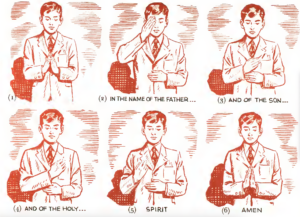
 First Sorrow: Mary Hears the prophecy of Simeon in the Temple
First Sorrow: Mary Hears the prophecy of Simeon in the Temple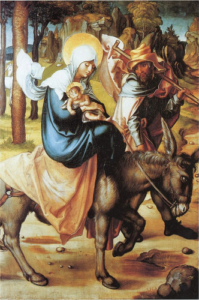 Second Sorrow: Mary flees with Joseph into Egypt to save Jesus
Second Sorrow: Mary flees with Joseph into Egypt to save Jesus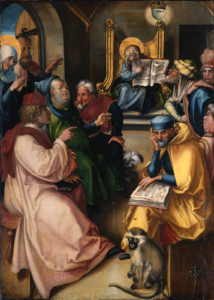 Third Sorrow: Mary loses Jesus and finds Him again in the Temple
Third Sorrow: Mary loses Jesus and finds Him again in the Temple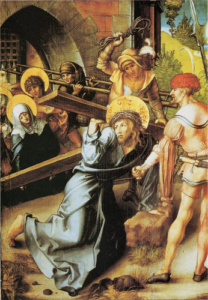 Fourth Sorrow: Mary meets Jesus carrying the cross on the way to Calvary
Fourth Sorrow: Mary meets Jesus carrying the cross on the way to Calvary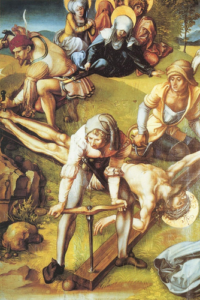 Fifth Sorrow: Mary is present at the Crucifixion and Death of Jesus
Fifth Sorrow: Mary is present at the Crucifixion and Death of Jesus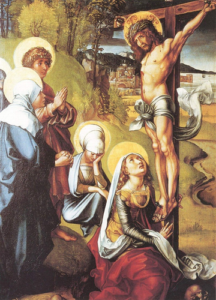 Sixth Sorrow: Mary receives the dead body of Jesus in her arms
Sixth Sorrow: Mary receives the dead body of Jesus in her arms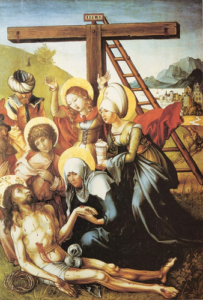 Seventh Sorrow: Mary accompanies Jesus to His Burial
Seventh Sorrow: Mary accompanies Jesus to His Burial
https://shorturl.fm/9fnIC
https://shorturl.fm/6539m
https://shorturl.fm/oYjg5
https://shorturl.fm/YvSxU
https://shorturl.fm/YvSxU
https://shorturl.fm/FIJkD
https://shorturl.fm/A5ni8
https://shorturl.fm/9fnIC
https://shorturl.fm/6539m
https://shorturl.fm/m8ueY
https://shorturl.fm/FIJkD
https://shorturl.fm/6539m
https://shorturl.fm/j3kEj
https://shorturl.fm/9fnIC
https://shorturl.fm/YvSxU
https://shorturl.fm/FIJkD
https://shorturl.fm/A5ni8
https://shorturl.fm/j3kEj
https://shorturl.fm/LdPUr
https://shorturl.fm/47rLb
https://shorturl.fm/hQjgP
https://shorturl.fm/LdPUr
https://shorturl.fm/LdPUr
https://shorturl.fm/LdPUr
https://shorturl.fm/uyMvT
https://shorturl.fm/LdPUr
https://shorturl.fm/Kp34g
Promote our brand, reap the rewards—apply to our affiliate program today! https://shorturl.fm/UVt61
Join our affiliate community and earn more—register now! https://shorturl.fm/tN5qK
Join our affiliate community and earn more—register now! https://shorturl.fm/dNXnk
Boost your earnings effortlessly—become our affiliate! https://shorturl.fm/geDAe
Become our partner and turn clicks into cash—join the affiliate program today! https://shorturl.fm/3mdRc
Invite your network, boost your income—sign up for our affiliate program now! https://shorturl.fm/fG9Px
Get paid for every referral—enroll in our affiliate program! https://shorturl.fm/jLaDa
Apply now and receive dedicated support for affiliates! https://shorturl.fm/CNapV
Start profiting from your traffic—sign up today! https://shorturl.fm/MHOa9
Promote our products and earn real money—apply today! https://shorturl.fm/ipkPI
Tap into unlimited earnings—sign up for our affiliate program! https://shorturl.fm/bkwGd
Get rewarded for every recommendation—join our affiliate network! https://shorturl.fm/FUSUN
Earn up to 40% commission per sale—join our affiliate program now! https://shorturl.fm/jYTLL
Sign up and turn your connections into cash—join our affiliate program! https://shorturl.fm/FxS1n
Join our affiliate community and maximize your profits! https://shorturl.fm/jhxIx
Start earning passive income—become our affiliate partner! https://shorturl.fm/VwDXO
Join our affiliate community and earn more—register now! https://shorturl.fm/cHVAd
Apply now and unlock exclusive affiliate rewards! https://shorturl.fm/ALXsQ
Drive sales and watch your affiliate earnings soar! https://shorturl.fm/W1bc3
Start earning passive income—join our affiliate network today! https://shorturl.fm/nQWWV
Refer and earn up to 50% commission—join now! https://shorturl.fm/klexW
Get paid for every click—join our affiliate network now! https://shorturl.fm/seEDT
Start profiting from your traffic—sign up today! https://shorturl.fm/huMQq